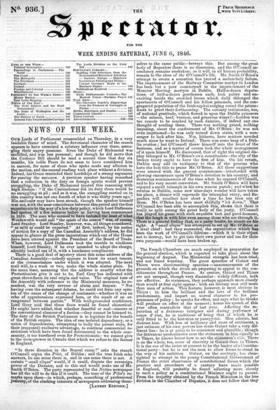NEWS OF THE WEEK.
Oun Lords of Parliament reassembled on Thursday, in a very laudable frame of mind. The devotional character of the season appears to have exercised a salutary influence over them, assua- ging their angry passions. Even the Duke of Richmond was mollified, and was less personal; and though he did move that the Customs Bill should be read a second' time that day six months, his noble Peers do not seem to have considered him in earnest, for none of those who spoke made any allusion to the motion, and the second reading took place without a division. Indeed, his Grace reminded their Lordships of a strong argument for passing the measure. A previous speaker having remarked that a reduction in the duty on foreign spirits would prevent smuggling, the Duke of Richmond treated this reasoning with high disdain : "if the Customhouse did its duty there would be no smuggling at sill ; and as it was, the smuggling carried on in this country was not one fourth of what it was thirty years ago." His audience may have been struck, though the speaker himself was not, with the near coincidence between this period and the first experiments in the way of a low-duty policy, which Lord Dalhousie had spoken of a few minutes before as having been commenced in 1819. The man who seemed to have imbibed the least of what Wordsworth would call "the spirit of the season" was, of course, Lord Stanley. Lord Stanley, however' was, all things considered, " as mild as could be expected." At first, indeed, by his notice of motion for a copy of the Canadian Assembly's address, he did appear to glance at the gross imputations which out of the House have been uttered against the President of the Board of Trade. When, however, Lord Dalhousie took the trouble to vindicate himself, Lord Stanley, if he ever intended to adopt the charge, adroitly backed out of it, with a handsome compliment. There is a good deal of mystery about this same address of the Canadian Assembly—nobody appears to know its exact tenons, or the circumstances 'under which_ it was adopted. The next mail will, in a week or two, make the whole matter plain. In the mean time, assuming that the address is exactly what the Protectionists give it out to be, Earl Grey has indicated with great shrewdness its real origin and value. The original tone of the Assembly with reference to the Ministerial measures, be re- marked, was the very reverse of alarm and despair. "Not having seen the subsequent debates, he could not form any opin- ion of the cause of the change of sentiment—whether it was an echo of apprehensions expressed here, or the result of an ar- rangement between parties." With well-grounded confidence, Lord Grey- said that these fears would be found chimerical. He might have added, that whether fanciful or real—sincere or the conventional clamour of a faction—they cannot be listened to. The duty of the British Parliament is to legislate for the benefit of the British empire. The idea of one isolated dependency, or a union of dependencies, attempting to bully the parent state, for their. (supposed) exclusive advantage, to continue commercial re- strictions which have been found detrimental to the whole com- munity, is too barefaced even for Protectionists: we cannot give to the corn-grower in Canada that which we refuse to the farmer in England.


















































